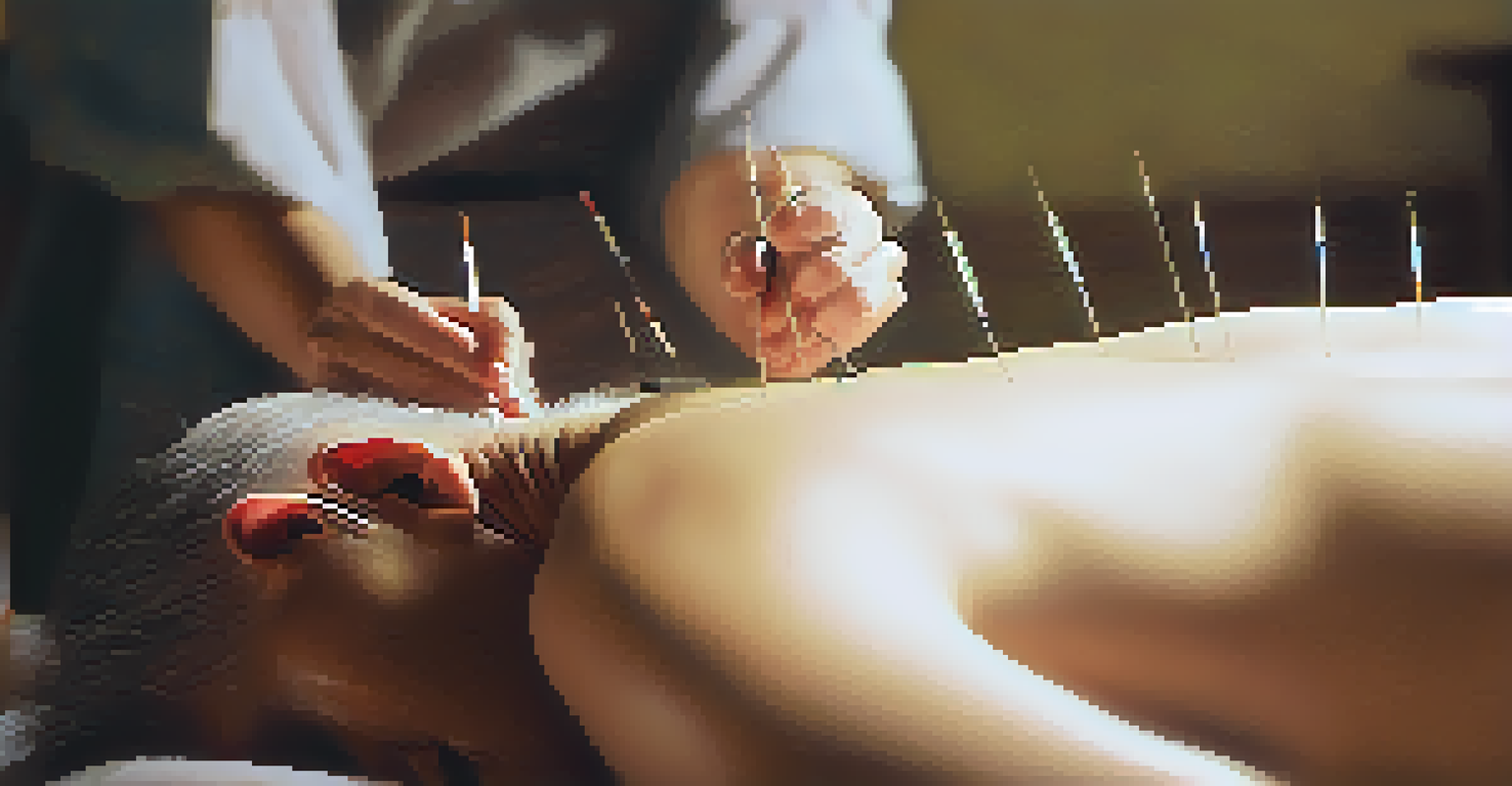Exploring Acupuncture as an Alternative Therapy in Recovery

Understanding Acupuncture: An Overview of the Practice
Acupuncture is an ancient Chinese therapy that involves inserting thin needles into specific points on the body. These points, known as acupoints, are believed to be connected to the body’s energy or 'Qi' (pronounced 'chee'). By stimulating these points, practitioners aim to restore balance and promote healing.
Acupuncture is not a treatment for a disease, but a treatment for the patient with the disease.
Although it may sound intimidating to some, many people find acupuncture to be a soothing experience. It’s often used to address a variety of issues, from chronic pain to stress relief. Like a gentle reset button for your body, acupuncture can help facilitate recovery by encouraging the natural healing processes.
This therapy is gaining traction as a complementary treatment in recovery scenarios, especially for those dealing with addiction or injury. In doing so, it helps individuals not only physically but also mentally and emotionally, making it a holistic approach worth exploring.
The Role of Acupuncture in Pain Management during Recovery
Pain management is a significant aspect of recovery, and acupuncture has been shown to alleviate discomfort effectively. Research indicates that acupuncture triggers the release of endorphins, the body's natural painkillers, helping to reduce both acute and chronic pain.

For example, someone recovering from surgery may experience less pain and reduced inflammation after a few acupuncture sessions. This reduction in pain can lead to improved mobility, allowing individuals to engage more actively in their rehabilitation process.
Acupuncture Aids Pain Relief
Acupuncture effectively triggers the release of endorphins, providing a natural method for managing pain during recovery.
Thus, integrating acupuncture into a pain management plan can create a more comfortable recovery experience. It provides an alternative to pharmaceuticals, which can have unwanted side effects, allowing patients to focus on healing.
Emotional Healing: Acupuncture's Impact on Mental Well-Being
Recovery isn't just about physical healing; emotional well-being plays a crucial role too. Acupuncture can help manage anxiety and depression, which are common issues faced during recovery. The therapy promotes relaxation and reduces stress, creating an environment conducive to healing.
The greatest medicine of all is to teach people how not to need it.
Imagine feeling a wave of calm wash over you after a session—this is a common experience for many. The practice can help regulate your mood and promote a sense of overall well-being, making it easier to face the challenges that come with recovery.
Incorporating acupuncture into a holistic recovery plan can provide valuable emotional support, helping individuals to navigate their feelings and build resilience. This emotional boost can be a game-changer in maintaining motivation throughout the recovery journey.
Acupuncture for Addiction Recovery: A Unique Approach
Acupuncture is increasingly recognized as a supportive therapy for those recovering from addiction. It can help reduce cravings and withdrawal symptoms, making the transition to sobriety smoother. This unique approach targets specific points associated with addiction and stress relief.
For instance, the NADA protocol (National Acupuncture Detoxification Association) is a popular treatment used in addiction recovery programs. It involves inserting needles into specific points on the ear, which can help calm the nervous system and promote emotional balance.
Support for Emotional Well-Being
This therapy not only promotes physical healing but also helps manage anxiety and depression, fostering emotional resilience.
By addressing both the physical and psychological aspects of addiction, acupuncture can play a vital role in a comprehensive recovery plan. This holistic approach can empower individuals to reclaim their lives and develop healthier coping mechanisms.
Combining Acupuncture with Other Therapies for Optimal Results
Acupuncture works well alongside other therapies, enhancing overall recovery efforts. When combined with counseling, physical therapy, or mindfulness practices, it can create a more rounded approach to healing. This synergy can lead to more significant improvements than any single therapy alone.
For example, someone attending therapy for emotional issues might find that acupuncture helps them relax before their sessions, making it easier to engage in the process. Similarly, those in physical rehabilitation might experience reduced pain and increased mobility when acupuncture is part of their routine.
This collaborative approach to recovery ensures that individuals receive comprehensive care tailored to their unique needs. By integrating acupuncture into a broader treatment plan, patients can maximize their chances of a successful recovery.
Finding a Qualified Acupuncture Practitioner for Recovery
Choosing the right acupuncture practitioner is essential for a positive experience. Look for licensed professionals with experience in treating conditions related to recovery, such as pain management or addiction. A qualified practitioner will take the time to understand your specific needs and tailor their approach accordingly.
Consider seeking recommendations from healthcare providers or support groups, as personal experiences can guide you to reputable practitioners. Many acupuncturists also offer consultations, allowing you to discuss your goals and concerns before starting treatment.
Holistic Recovery with Acupuncture
Integrating acupuncture with other therapies enhances overall recovery efforts, creating a comprehensive and tailored treatment plan.
Ultimately, finding the right fit can significantly impact your recovery journey. A skilled and compassionate acupuncturist can create a supportive environment that fosters healing and encourages your overall well-being.
What to Expect During an Acupuncture Session in Recovery
If you're new to acupuncture, you might wonder what happens during a session. Typically, you’ll first have a consultation where the practitioner discusses your health history and recovery goals. This conversation is crucial as it helps the acupuncturist develop a tailored treatment plan.
Once the session begins, you’ll lie down comfortably while the acupuncturist gently inserts needles into specific points on your body. Many people report feeling a slight pinch or pressure, but the experience is generally quite relaxing. You may lie still for about 20 to 40 minutes as the needles do their work.

After the session, you may feel a sense of calm and relaxation, along with reduced pain or stress. This immediate feedback can be encouraging, motivating you to continue with acupuncture as part of your recovery journey. Just remember, each person's experience can vary, and it may take a few sessions to notice any significant changes.